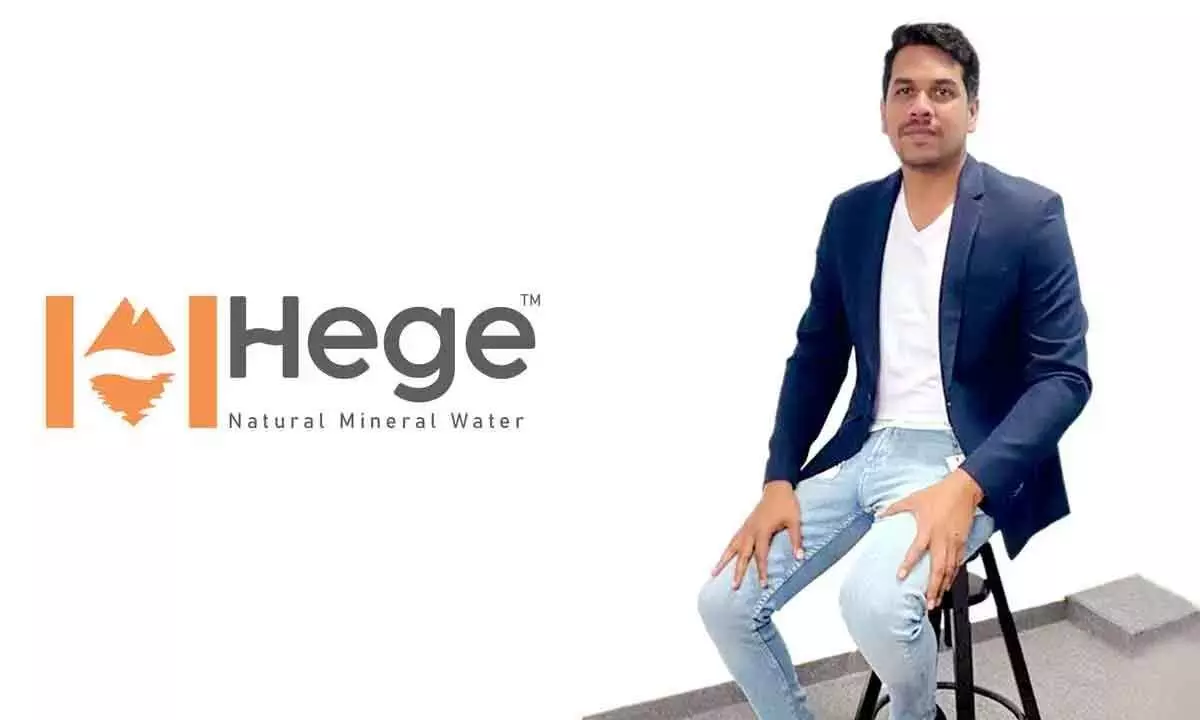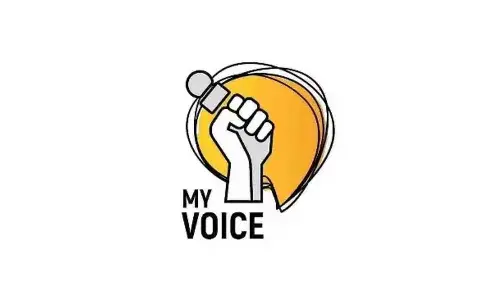Hege brings water from Himalayas to homes

The Hyd-based startup aims to expand in India, as well as launch operations in the overseas markets
Hege Natural Mineral Water is known for its purity. It is sourced from the mountain bedrocks in Himachal Pradesh. So, it retains a very unique, natural and soothing flavour. It is neither touched nor processed. It is free from the risk of foreign pollutants. It has inevitably passed through layers of rock, clay and sand. It also remains free from bacteria naturally.
In an exclusive interview, Shailendra Rao, Founder of Hege - Natural Mineral Water tells Bizz Buzz about the benefits of drinking natural mineral water. He also informed about the hazards in the consumption of ground water and packaged drinking water. He further revealed the ambitious expansion plans of the Hyderabad-based startup.
Being a commercial pilot, how did you enter into bottled water business?
After my graduation, I started my career as a commercial pilot and later gained the license of certified flight instructor to train pilots. While I was working in Miami, I and my friend started a water bottle company at Hyderabad with a mere investment during a leisure holiday in 2013. This remote side hustle has helped me gain great insights into the world of water business.
We used to live at a farmhouse in Organo's community near Moinabad, where everything is natural except drinking water. The integrated ecosystem is consciously created with sustainable things like solar power, and organic products like pesticide-free food items. Though we were eating organic vegetables and milk, I know that we were not consuming natural water.
At that time, I observed that the available packaged drinking water isn't really pure. A lot of processing is required, resulting in 200 per cent waste of water from the RO (reverse osmosis) purifiers. Moreover, various dangerous chemicals are to be added for its taste, pH and shelf life. Even the water from RO purifiers at homes lacks the quality that is needed for our human body.
Could you throw some light on the issues related to consumption of ground water, packaged drinking water and RO water?
The process of packaged drinking water includes chlorination of raw water, RO filtration and ozonisation. While purifying the water by removing chemicals like arsenic, cadmium and lead, all the essential minerals like calcium, bicarbonates, magnesium, potassium and other trace elements are also removed.
The ozonisation process is done for increasing the shelf life, chemical dosing for maintaining pH value and synthetic chemicals to add artificial minerals. Alkaline purifiers are the new fab and trend in the commercial market claiming alkaline water is very beneficial and helps cure even cancer but no such scientific evidence or its health benefits are proved by a medical authority.
All major RO brands follow filtration through the process which involves removing chemicals along with the minerals similar to the process of packaged drinking water thus making it dead water not fit for consumption. Consuming these waters for a longer time causes bone related issues, cardio vascular problem, malnutrition, underdevelopment, miscarriages and cancers.
In these modern times our ground water is polluted to an extent of unconsumable due to the pollution by industries, and usage of fertilisers and pesticides. In few areas, groundwater is also contaminated as deep as 2,000 feet below the sea level. I have made an exit from that water business and also took a break in my pilot career to do more research on good drinking water.
Could you let us know more about your research on natural mineral water?
Spring water is predominantly found in areas where pollution is null and it is widely used in Western, Middle Eastern and South East Asian countries on day to day basis. This is usually non-treated, chemical free and contamination free. They have good nutritive value along with balanced total dissolved solids (TDS) and pH (a measure of acidic/ basic water).
The best TDS level could be less than 250 parts per million (ppm) and above 50 ppm. In both packaged drinking water and RO purifiers, the TDS is around 10-50 ppm. Ideally, our blood has pH range of 7.35 to 7.45 and we need a balanced pH to maintain our body's acid balance. But, some water purifier brands provide water with pH of 8.5 and above.
The natural mineral water in India is found in only few licensed sources, mostly across the Himalayas and the foothills. These confined aquifers are free from pollution, chemicals, pesticides and contamination. The water from these sources is enriched with naturally good minerals and micronutrients, making it directly consumable and good for health.
Three glasses of water has the same amount of calcium available in one cup of milk. The ground water contains calcium, magnesium, potassium and bicarbonates, but the RO purifier flushes out all these minerals that are essential for our body. During my stay at Himalayas for one and a half years, I searched for natural mineral water and that is how we found the source of Hege.
When Hege was conceptualised and how do you re-entered into the bottled water business?
Understanding the demand and more focus on the lifestyle and consumable lot of population is making its shift to organic living and mindfulness, the ideation of Hege happened way back in 2018 and it took a couple of years to visit all the licensed sources of water. Finally in March 2020, we found the ground water source in the northern Himachal Pradesh.
This confined aquifer is free from any pollution. The water is only mechanically filtered using fine sand to remove any organic particles and doesn't treat the water with any chemicals and or other treatment. As a brand, Hege was incorporated in September, 2020 and we started the marketing operations at Hyderabad and Bengaluru from February 2021.
Is the pandemic a blessing in disguise for your business?
Immediately after the launch of Hege, there was Covid second wave, we had to halt all our operations and again restarted in the month of July same year. Suddenly, we observed people turned a lot more conscious and shifted to healthy water. There was massive awareness on drinking pure and natural water.
People were boiling the RO water and mixing holy basil (tulasi) leaves before consuming the water. Many health conscious households were looking for pure natural mineral water on Google and other social media platforms. We started receiving several online orders in no time. We added 500 customers in Hyderabad alone, and the number is continuously growing.
What are the benefits of Hege natural mineral water?
Hege is certified by Bureau of Indian Standards (BIS), Hazard Analysis and Critical Control Point (HACCP), Food Safety and Standards Authority of India (FSSAI), IS0:9000 and ISO:22000. It undergoes 21 strict quality parameters before it is filled and delivered directly to our customers' homes in Hyderabad and Bengaluru.
Our pure natural mineral water is loaded with essential minerals like calcium and magnesium with the highest bioavailability to the human body. These minerals are helpful in stabilising the blood pressure and reducing the risk of heart diseases. Loaded with 263 mg per litre of bicarbonates, Hege's naturally alkaline water offers the best natural cure to acidity issues.
Moreover, this water contains micronutrients and it doesn't need any artificial enrichment. At 70 mg per litre, it is as good as a low-calorie calcium supplement. It is natural alkaline drinking water with pH of 8, and it inactivates the enzymes linked to acid reflux. Similarly, bicarbonates in alkaline water also act as an antacid that relieves heartburn and acid indigestion.
What is the total capacity of the confined aquifer and current capacity utilisation?
The geologists' survey has expressed a capacity of 6 lakh litre per day. Right now, we are utilising only up to 25,000 litre per day. Out of this, our customers in Hyderabad are consuming roughly around 17,000 litre per day, while the rest is consumed in Bengaluru. On an average, a family spends approximately Rs 4,800 per month for consuming our natural mineral water.
What is the investment made so far? Are you planning to raise funds in near future?
Hege is an ambitious startup. Till now, we have bootstrapped our business and not raised any investments from external sources. Shortly, we are looking at raising pre series - A funding before August this year to fuel our growth plans.
What are the company's expansion plans in coming few years?
Hege is launched with a global vision and we are looking to launch in the overseas market like Middle East and South East Asia by the end of this calendar year. We are expecting licenses from the respective countries. In the next months, we are also aiming to expand to three major cities in India – New Delhi, Mumbai and Chennai.
Hege is the first natural mineral water brand in India to launch in 20 litre cans. When compared to brands like Himalaya and Vedica (Bisleri), it is 40 per cent cheaper in price. Alongside, it is being launched in portable sizes - PET (polyethylene terephthalate) and glass water bottles of 500 ml, 750 ml and 1,000 ml.











